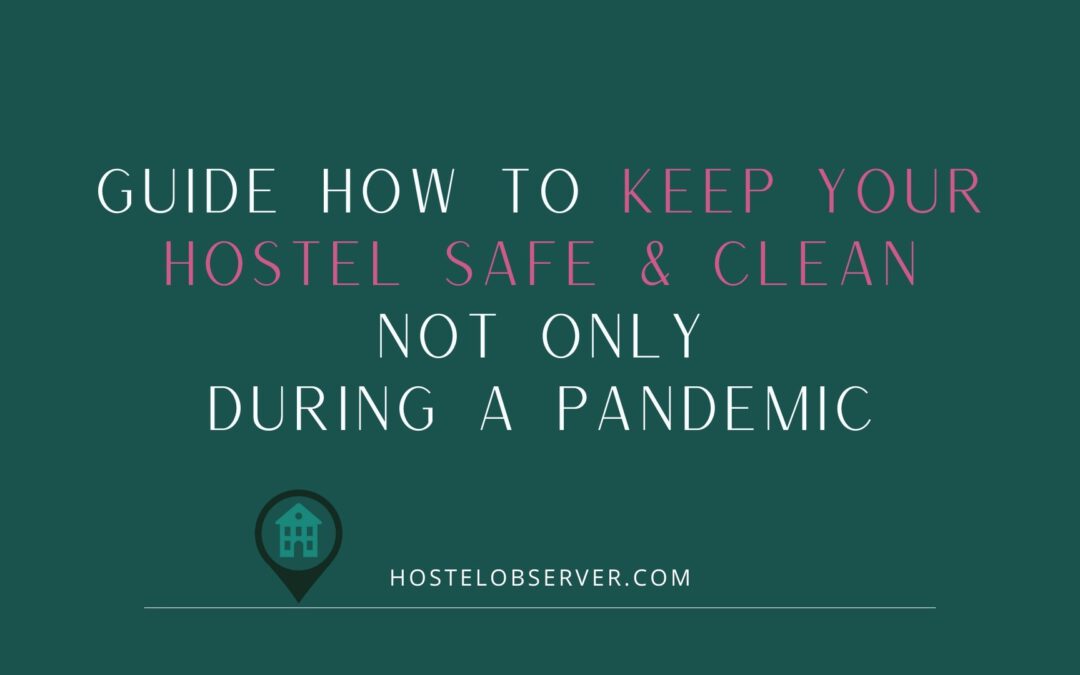In any crisis, leaders have two equally important responsibilities: solve the immediate problem and keep it from happening again.
Bill Gates
On February 28th, 2020, the biggest tourism exhibition, the ITB 2020 in Berlin, Germany, was canceled due to concerns for the spreading of the coronavirus. After its outbreak in China in December 2019, more than 85,000 infected cases have been confirmed in 60 territories, of which 8,000 were classified as serious. At least 2,900 deaths have been attributed to the disease and more than 39,000 people have recovered (Source: Wikipedia).
Public health responses in China and around the world have included travel restrictions, quarantines, and curfews.
The (online) discussion about such measures is divided. Some consider restrictions and cancellations exaggeration and see the economic downsides (Source) while others welcome such decisions:
“Experts believe the decision to cancel the ITB was right. In a worst case scenario, a major Coronavirus outbreak at the fair, 180,000 people would have been at risk, along with millions of people they would have been in contact with, at the fair itself, on the plane or train, in their home countries and in Berlin.“
What do we think about the coronavirus discussion?
We neither want nor are entitled to get into a discussion about which countries and communities should or should not increase their precautions.
It’s not our intention to either increase your worries – nor do we want to lower them.
So why are we writing this post anyway?
Because a transparent discussion about the coronavirus is crucial for the travel industry!
The tourism sector with people traveling from and to various destinations is especially affected by the virus. Travelers can ex- and import COVID-19. Traveling in closed settings such as trains, airplanes or cruise ships puts hundreds of people from unknown destinations in one place, statistically increasing the possibility to spread the virus.
Hostels are places where strangers who often travel solo are out of anyone’s reach and control and it is up to the management to take precautions for staff and guests against the background of the interaction of many people in small spaces.
Therefore, we want to stress hostel leaders’ responsibility for their staff and guests’ wellbeing.
To take ownership, we encourage every leader and staff in the hostel business to educate themselves in order to make their own, right decisions.
So what’s in for you in this blog post?
In this blog post, we want to provide you with official resources about the coronavirus. Moreover, we collected the most important precautions to take and applied them to a hostel business. A business, where a lot of people share common rooms. Where the staff takes turns in shifts and needs to stay educated about a complex topic in an easy manner. Where guests come and go from different places. And where investments are most often kept low.
Read on if you want to find some easy-to-follow and even fun ideas about how to keep your hostel guests, hostel staff and service providers and hence your hostel business healthy during times of the virus – and beyond.
Step One: Educate yourself about the coronavirus.
As a hostel leader, you have a responsibility towards staff and guests and should make your own educated decision!
We recommend staying up to date about the coronavirus with serious resources. Make sure not to follow every social media fad but chose wisely. For example, check out the website of the World Health Organization.
Next to that, choose the health organizations of your respective countries to stay up to date about what is happening in your communities.
Social Media makes it easy for you and your staff to follow the updates!
Take a shortcut and follow their Social Media Profiles and ask your staff to do so. Here you will find the latest news with visual recommendations. A good way to help you explain complex matters easier.
Step Two: Make your hostel virus-proof!
In the following text, you will find hands-on ideas about how to prepare and realize precautions in dealing with the virus threat in your house.
We want to help you
- be prepared
- make responsible and smart investments
- use resources wisely
- help you find DIY-solutions to save some €, $ or else…
- make the best of of the situation and even get new strategies for your hostel marketing out of it
For this, we will share some easy to follow but crucial advice on how to involve your staff, guests and even house in keeping your place safe.
Healthy People – Healthy Hostel Business
In all your decisions, people should come first and hostel owners and managers should now – and always – put their staff, guests and their own health before any profits.
To accomplish this, you should be willing to make investments. Those investments will payout in the long term – contributing to a suppression of the virus as well as avoiding bad reviews for your hostel if anything should go wrong. All precautions are about education and infrastructure – and even your cleaning staff can contribute to your people and place staying safe.
Let the WHO give you some advice on how to deal with the coronavirus:
In a nutshell, the most important advice you will get here:
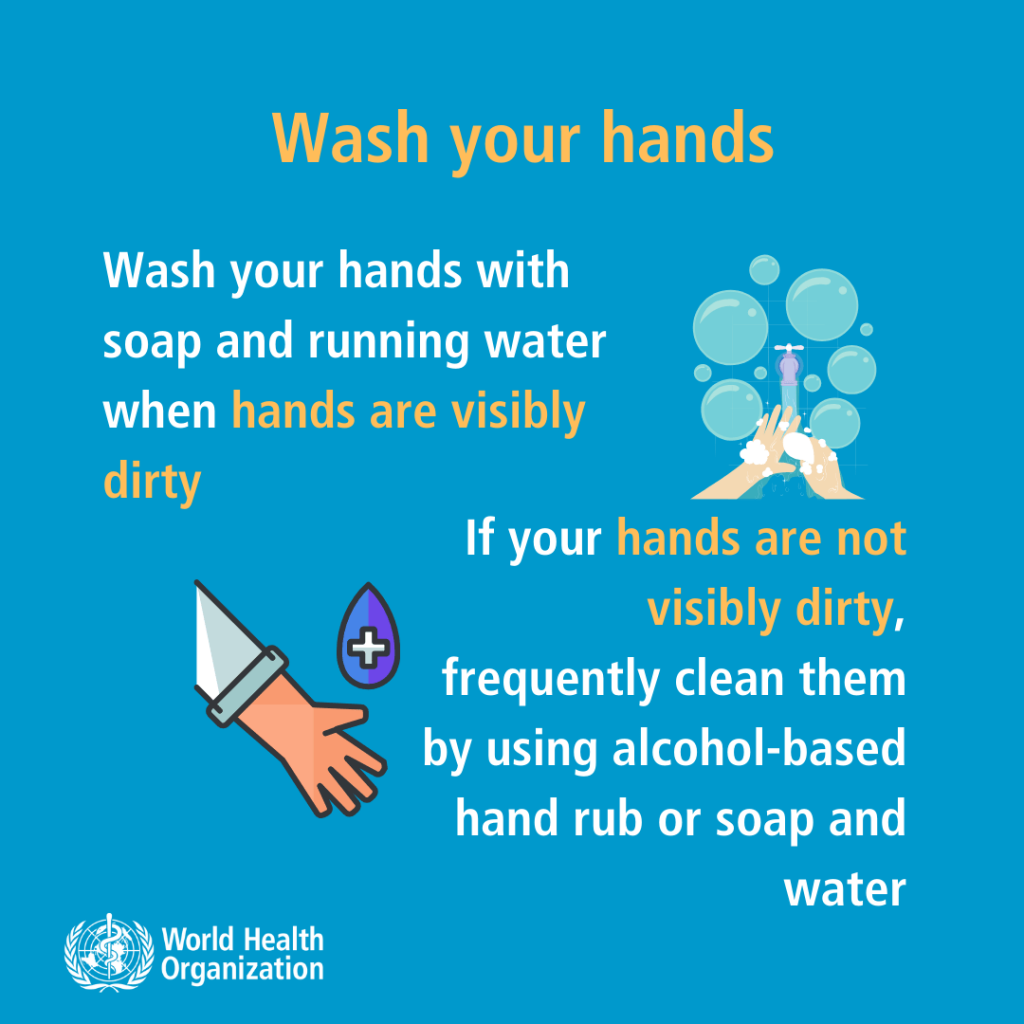
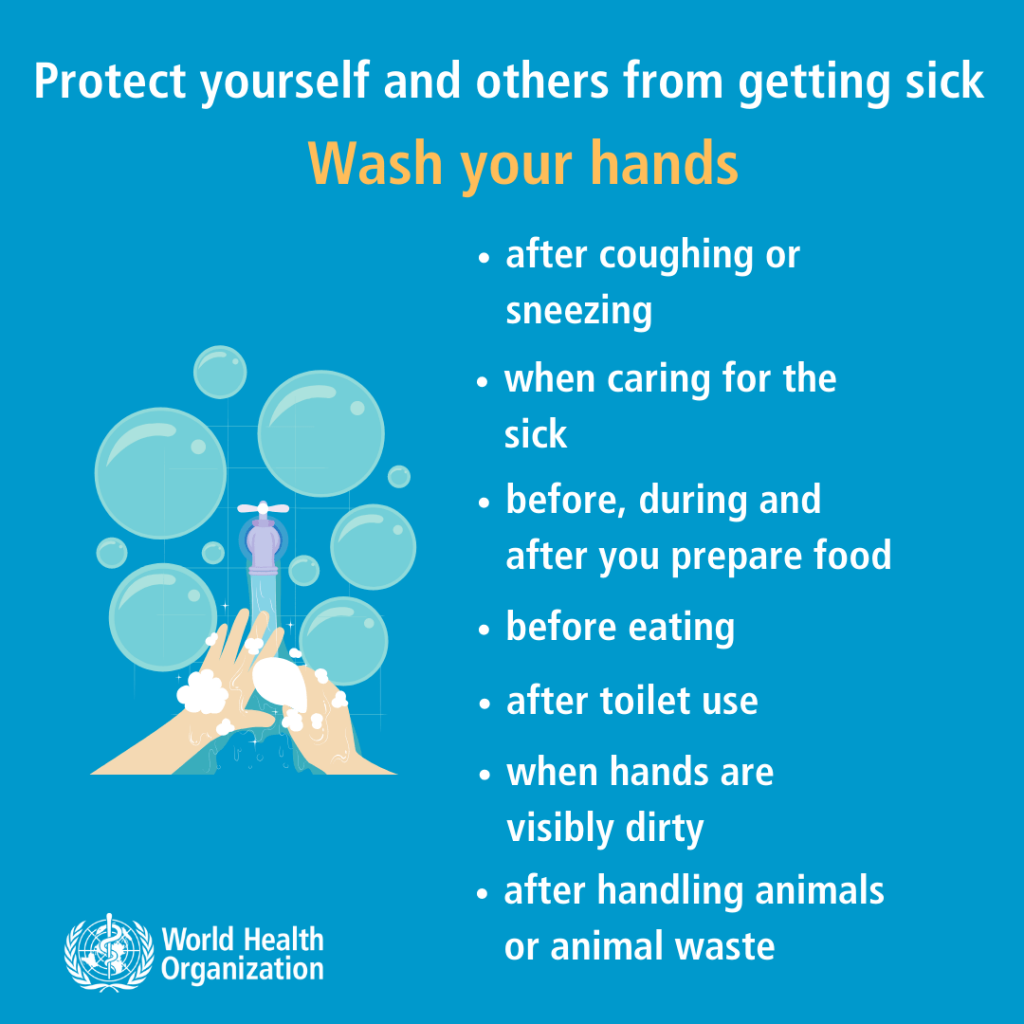
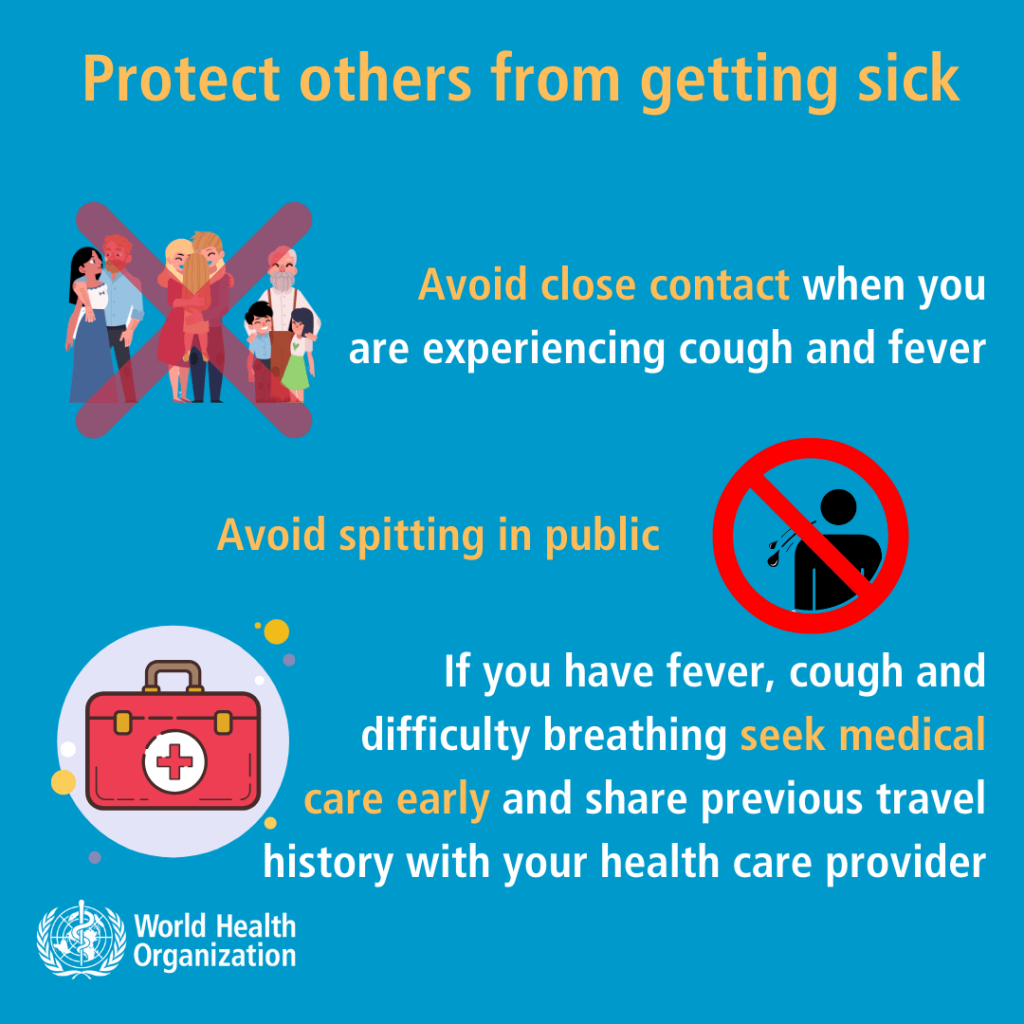
WASH AND DISINFECT HANDS CORRECTLY – Wash your hands often with soap and water for at least 20 seconds or clean your hands with an alcohol-based hand sanitizer that contains 60 to 95% alcohol, covering all surfaces of your hands and rubbing them together until they feel dry. Soap and water should be used preferentially if hands are visibly dirty. Avoid touching your eyes, nose, and mouth with unwashed hands.
Start with educating and encouraging the always healthy habit of washing hands – frequently and thoroughly. If you want to find out how check out this video:
COVER YOUR SNEEZES & DO NOT SPIT – It might seem obvious, but this is the right way to sneeze:
DO NOT SHAKE HANDS – This is the time for you to find a funny and memorable greeting for your staff and guests! How about a signature wave or nod to welcome your guests in a funny way? “Hey Ho. Welcome to HealthyTownHostel! Let us be of your service.”

Daily routines to encourage all the aforementioned habits in your staff and guests:
The theory is easy, execution is harder. And changing habits takes some time. Here are some tips about how to accelerate your staffs` adaptation of the safety rules: Click To Tweet- Start your day with a team reminder about those activities
- Set up an alarm that will remind everyone to wash their hands after a certain time.
- Ask everyone if they washed their hand whenever you meet them or before they have any food.
- And don’t back away from punishing bad behavior! This is bigger than just a little disobedience. Send people home if they think their not wanting to cover up a sneeze is more important than protecting the team from getting a virus!
- Make it a team effort! Encourage everyone to praise good, and refuse bad behavior!
Be honest to yourself – can your staff even access water and soap frequently during their shift?
You must guarantee your staff will be able to follow your instructions even if this means some rearranging hours or even interiors.
If your staff can not leave their desk or position during their shift, improve your working schedule. Why not going for a double shift and letting the other check the house for all the other bins and tissues you provided. Click To TweetMake sure to provide liquid or solid soap in all bathrooms in the house. Try to go for bulk buying and refill options instead of single-use soap packages. You will save yourself money and packaging. Check out if there are plant-based soap options too. Most often, they irritate users least so you will be save with this part too.
Moreover, provide water-free alternatives to soap. An affordable and still useful version is a two-ingredient hand sanitizer made of rubbing alcohol (Isopropanol) and aloe-vera gel. To see how it’s done, check out this video:
Encourage your staff to use the sanitizers frequently – even if they do not feel like their hands are dirty.
Advice: Provide some lotion or creme as a relief. Rubbing alcohol might dry out the user’s skin so make sure to help your staff keeping their hands soft.
Also, inform your hostel guests that sanitizers are available and the management has introduced risk mitigation measures.
Provide material and infrastructure for hygiene measurements
Provide single-use tissue boxes
Make sure to have enough single-use tissue boxes around your hostel. As you might need a lot of them, choose recycled paper tissues in recycled boxes.
Distribute the boxes on every bed instead of just one in the room. Or even try a DIY solution – and make the boxes out of your leftover coffee-to-go cups just like in this video:
Be creative: The goal is to make sure guests and staff have tissues handy wherever they are. This way you will be able to guarantee that people use a tissue rather than their hands or even your fabrics in the hostel when sneezing or equal.
Provide closed bins
While you encourage your staff to use tissues to cover up coughs or sneezes, you will need to make sure these are disposed of properly.
Make sure to have bins for those tissues and other disposable items around your hostel. You do not need to buy new ones – why not labeling old buckets as “bin” and putting a cover on them so people understand how to use them.
Should hostel staff (or even guests) wear facemasks?
A lot of resources propose the frequent use of a facemask. They are not only for people showing symptoms but a great resource in stopping the spreading of the virus.
In general, it’s recommended to wear a facemask when one is in danger to be sick already or if one is around a lot of people from unknown destinations (e.g., sharing a room or vehicle).
This part is especially valid in a hostel.
Therefore, facemasks could be an option for your staff to stay save from guests – while it can also become a good option for your guests to have a healthy stay, especially in shared multi-bed dorms.
However as strangers sleep in one room together, there might be different understandings between them as to what precautions to take. Depending on where your hostel is located, some cultures might be used to wearing facemask – while others will refuse to do so.
Also, you can encounter two scenarios: Your guests might get suspicious if everyone in the hostel wears a mask even if there is no reported outbreak in your city. On the contrary, guests might be relieved that they see the hostel, staff and other guests taking precautions and behaving responsibly.
So how can you deal with this discrepancy among hostel staff and even guests?
This is a question we can not answer and encourage hostel managers to discuss with their staff!
Therefore, you choose: Why not lead by example and provide facemask for your staff AND guests. Inform your staff about the benefits of wearing a mask and ask everyone to do so. So there will not be one staff member the odd one out who then might have a bad influence on your staff.
Once your staff wears face masks with ease, your guests will too. Offer facemasks as a free service to your guests upon arrival.
More guest hygiene ideas:
If you are not using bed numbers yet – This is a great time to start! Assigning guests to a certain bed will add to making sure that your guests do not use someone else’s bed by accident. Moreover, it could help you identify the source of infection – should this be the case in your house – more easily and make you take better precautions with this bed afterward (see cleaning and laundry).
Cleaning all “high-touch” surfaces every day
Since the virus might be found in human saliva it might be transported on furniture and interiors through your guests or staff hands.
Therefore it's not only about keeping people, food and laundry clean – surfaces in the hostels surrounding should be kept cleaner in this season even more. Click To TweetFor this, instruct your cleaning personnel to regularly clean the following interiors with a lightly wetted, antibacterial cloth (and dispose of this regularly too).
- Counters of your desk and bar
- Phones and headsets
- Tabletops in public rooms and dorms, and bedside tables.
- Doorknobs everywhere in the house, especially close to the bathrooms
- bathroom fixtures
- Toilets
- Keyboards and laptops
- Lockers – out- and inside
- Tablets
- Also, clean any surfaces that may have blood, stool, or body fluids on them.
Educate your staff on using detergents and antibacterial liquids responsibly
It is always a good idea to study label instructions. Make sure your staff read the instructions of the cleaning products. Especially when dealing with bacteria and viruses, wearing gloves and making sure the rooms and houses have good ventilation during the use of the products is very important for the safety of the user.
If you are looking for a cheaper and greener alternative, check out how you can even DIY your disinfect spray here.
Preparing shared and common rooms in a hostel
Take good care of your common kitchen! It is recommended to avoid sharing personal household items. Guests and staff should not share dishes, drinking glasses, cups, eating utensils, towels, or bedding with other people or pets. After using these items, they should be washed thoroughly with soap and water.

The guardian consults: “If you are in an affected area avoid eating raw or undercooked animal products and exercise care when handling raw meat, milk or animal organs to avoid cross-contamination with uncooked foods.”
All this seems pretty difficult in a hostel setting. However, this IS especially important for shared rooms such as the common kitchen.
So how to cope? In the hostel, instruct your regular and cleaning staff to check on the kitchen more regularly. Go ahead and make sure that you have enough utensils for your guests to be able to have a choice of plates and pans. Make sure there is enough dishwashing detergent or similar liquids or soaps for the guests’ usage.
If you also sell and prepare food in your own kitchen, instruct your kitchen staff on a responsible use of cutlery and dishes. Provide and remind everyone to wear plastic or latex gloves when cleaning the areas and when preparing food (see why here).
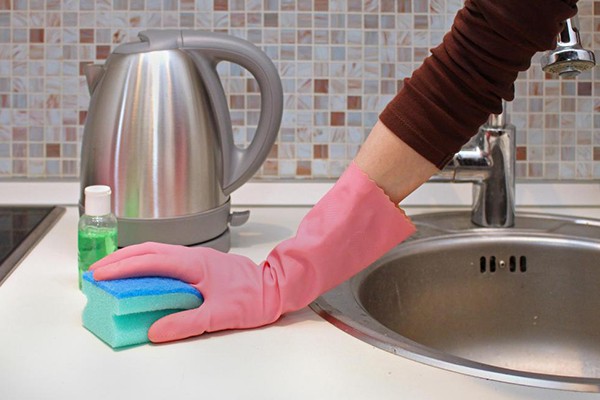
Make it easy for everyone to understand the rules!
Be proactive: Set up signs for both, guests and personnel, about the usage of material and food. If your guests fail to comply, consider closing the common kitchen for a while with the information why you did so. Click To TweetAs for not sharing cups and classes – this would sound like a great time for single-use options. However, this can even become a chance for you to sell merchandise. Have you thought of selling branded, non-plastic coffee-mugs to your guests? Give a discount on these and see how your guests will take better care of their own mug once paid for – rather than leaving drinking glasses on the table.
Grab a permanent marker (or sharpie) and sign your guests’ mug with their name to give it a personal touch and make it easier to recognize – check out this video about this idea:
Does it matter what food you offer in your hostel?
With uncertainty about the transmission of this virus through living and dead animals try avoiding meat in the kitchen. We think you should see it as a chance:
Why not give a plant-based diet for your staff and menu for guests a try?!
How about oatmeal for breakfast? With plant-based milk or even just hot water a banana or other fruit – and your guests will stay happy for hours. Check out the yummy recipes here.
Rice, vegetables and some spices and there goes your home made curry. Find some inspiration for every budget here.
Last but not least! Keep your hostel staff healthy and look out for symptoms.
According to the World Health Organization (WHO) “Common signs of infection include respiratory symptoms, fever, cough, shortness of breath and breathing difficulties. In more severe cases, infection can cause pneumonia, severe acute respiratory syndrome, kidney failure and even death.” (Source).
u003cstrongu003eEducate and empower your staff to keep their eyes open for those symptoms when guests arrive and during their stay!u003c/strongu003e Click To TweetSeek medical attention if you encounter any of those symptoms in you, your staff or guests.
However, before seeking care, call the healthcare provider and tell them that you have, or are being evaluated for, COVID-19. Put on a facemask before you enter the facility.
These steps will help the healthcare provider’s office to keep other people in the office or waiting room from getting infected or exposed.
Younger and healthier people are less endangered of falling ill of the virus – let alone suffer severe symptoms. Therefore, hostel managers should make sure to encourage and support their staff in a healthy lifestyle.
This is how you can help keep your staffs` immune system strong:
- Distribute fresh fruit and encourage your staff to snack on WASHED FRUIT during the day
- Encourage quitting smoking. Smoking suppresses the human immune system. How about a team challenge with a reward for those who quit smoking first!?
- Encourage drinking water – infused with ginger and lemon. Hand everyone their reusable mug or glass and remind everyone to drink their 1-2 liters per day (the warmer your area, the more one should drink)
- Make sure your staff gets enough rest during their shifts and between. Make sure to check the schedule and avoid double shifts. Invest in more staff now – to keep your business for longer!
- Make sure that shared spaces in the house have good airflow, such as by an air conditioner or an opened window, weather permitting.
In case you have a diagnosed infection or suspicion in your house, here are the precautions for your cleaning staff:
- Wear a disposable facemask and gloves when you touch or have contact with the patient’s blood, stool, or body fluids, such as saliva, sputum, nasal mucus, vomit, urine.
- Place all used disposable gloves, facemasks, and other contaminated items in a lined container before disposing of them with other household waste. Clean your hands (with soap and water or an alcohol-based hand sanitizer) immediately after handling these items.
- When removing personal protective equipment, first remove and dispose of gloves. Then, immediately clean your hands with soap and water or alcohol-based hand sanitizer.
- Next, remove and dispose of facemask, and immediately clean your hands again with soap and water or alcohol-based hand sanitizer.
How about the laundry?
Yes, wash it thoroughly.
In case you are handling your laundry in the house, here are some instructions on how to deal with an infected guest`s laundry. Should you work with a laundry company, discuss the matter with them to take joint measurements.
- Immediately remove and wash clothes or bedding that have blood, stool, or body fluids on them.
- Wear disposable gloves while handling soiled items and keep soiled items away from your body. Clean your hands (with soap and water or an alcohol-based hand sanitizer) immediately after removing your gloves.
- Read and follow directions on labels of laundry or clothing items and detergent. In general, using a normal laundry detergent according to washing machine instructions and dry thoroughly using the warmest temperatures recommended on the clothing label.
Do you have any other advice or best practice that has proven well in a hostel or even coliving setting?
Please share your thoughts in the comments.
Subscribe to our social media channels to stay up to date for more news regarding safety in hostels.
Stay healthy!
Sources:
- https://www.cdc.gov/coronavirus/2019-ncov/hcp/guidance-prevent-spread.html
- https://www.theguardian.com/world/2020/feb/25/how-to-protect-yourself-from-coronavirus
- https://insights.ehotelier.com/insights/2020/01/30/how-to-protect-your-hotel-guests-and-staff-from-coronavirus/
- https://namescon.com/news/mastering-the-art-of-the-no-touch-handshake/
Sign up for the HostelObserver newsletter to receive more helpful hostel business advice:
The form you have selected does not exist.

